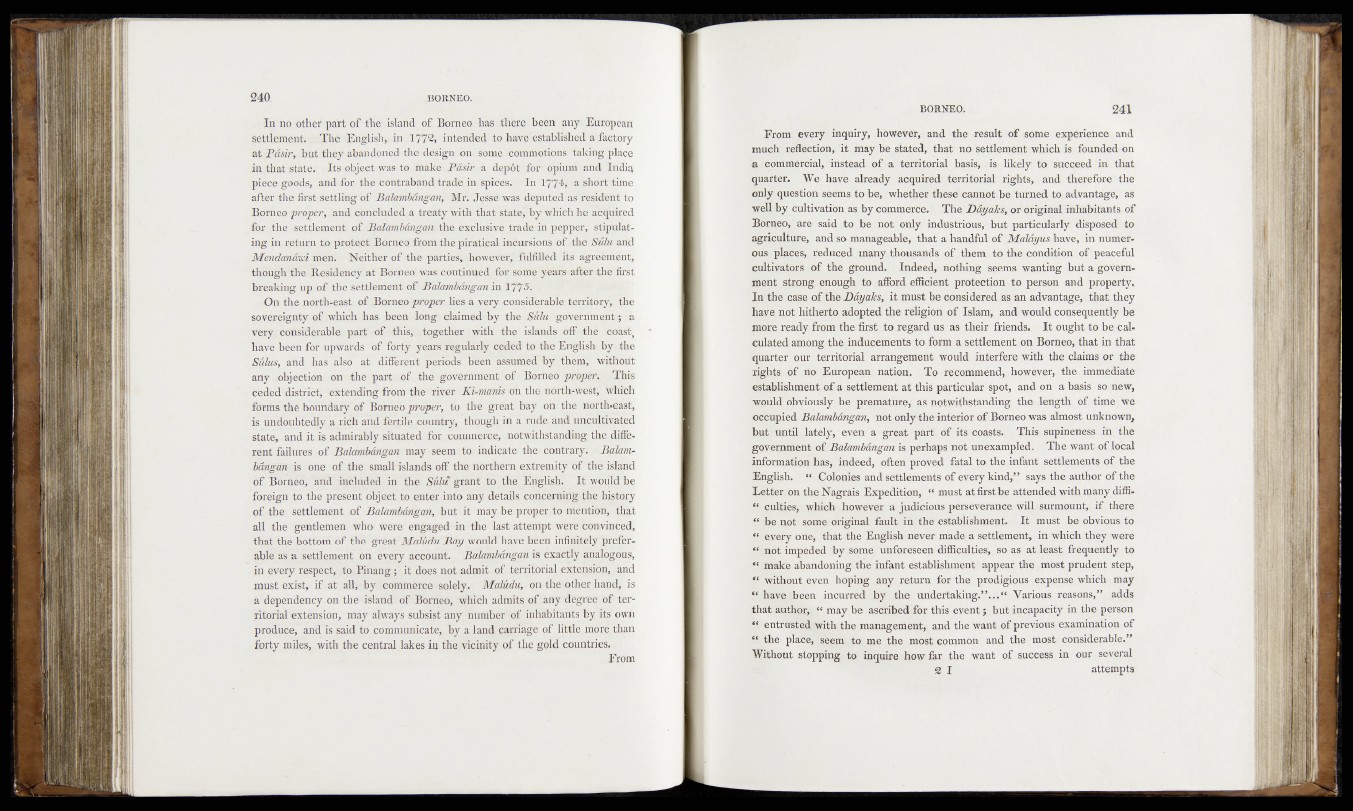
240 BORNEO.
. In no other .part of Sip island of Borneo has. there heenîïpnyt. European
settlement. .'ïSThé «English; in 177^, intended' to have »established aSiiretory
at Basir, but they abandoned the design oh^some commotions taking.uplace
in that state.4 t Xtsiobject‘jvas to makedP'âsir à dgpôfc.'for 'opium and'India
piece goods, and for thei contraband trade in spices. J-ffln 1774, a^ortetëfne
after the firsfsettling of Bdlambangan, Mr. JessC-was deputed?^#resident to
B,oTheo proper, uhd.èbnfcludedjà treaty with that'State, by which he'acqiîired
for^the (settlement' of Bafambangap]thé exclusive trade in pepper, stipulating
in return,-.to- protect-., Borneo, from'the piratical, incursions of .the 'iSulw.arid
Mendana/wi nsèn; Neither of the parties, -howfeKer^ftilfilled @:;agrefement,
though'tlife'jHefsidency.-at Borneo! was contiriued.fbr some yeafsraftërcthemfst
breaking up of- jtbe settlement of Bàlambângan in 1775-
On the north-east of iBorneo proper lies a very considèraplei territforyy,?tbe
sovereignty of ;which has been long ' claimed by the Sülu- government,^' à
very, considerable part of'this, together with the islands off bhe -Yccas^
have be^n for upwards"^öf fatty- years’rëgulafly Gëdfed to the English, bytxthe
Sûlus, and has. also ât diÔerehh'perïpds1 Debh a s^ü^ohy. them,-
any ^objection imr the part ibf A e -govèrnmentj?pj^B®i»^^jpï5óp(p^*|^is
Ceded district, extending from the river Ki-manis dh the'hórlföwe^tf^wpMÊh
forms the boundary of Borneo proper", to the “great bay .b^M^^^rm-€ast,
is undoubtedly a rich and!fert3e cpuntry, though i£t a rude^and lincryth^Ced
state, and it is admirably situated .for ecommerce, notwithstandingî.ihêfûiffe-
renf failures of Balambangan may seem -t'oUndicate the contrary.■.'üBmâm-
bângàn is one of the small islands off the northern extremity ^jf^ïïë .'M'khd
ôf Borneo, 'ancf'included in the Sûlu grant to the English. It would be
foreign to the present object.to enter into any details concerning, the history
of the settlement of Balamhanganribnt it may Be-proper .to^eiMon,-that
all the gentlemen who were engaged- in the last attempt were 'convinced,
that the bottom of'ffie "|*r éat 'MalïiduBay would havé Been ihfimtMjofeefer-
able as a settlement on every account. Bàlambângan is exactly'^mogous,
in every'respect, to Binang $ it does, not admit of, territorial extension, and
must-'exist,.- if at all, by 'commerce .-solely. Muludu, on the .other, handy is
a dependency on the islahÜ óf-Borneo, which admits ofrimy degree of'ter-
ritörial éxtéûsibn, may always subsist any number‘b f 'inhabitants'By îts own
produce, and is said to communicate, by a land carriage of little more than
forty, miles, with the central lakes in the vicinity of the gold countries.
Erom
BORNEO. 241
From every inquiry, however,4 and 'the -result of some experience and
much Reflection, 'it may be stated, that' no settlement which is founded on
commercial, instead,:of a territorial. basis;>ris.;likely .'tb succeed 'in.that
quarter. We have-already acquired^ territorial., rights, and therefore' the
only question>!seenisv%,'b'e, - whether-!}these-' cannot- be turned to advantage, 'as
well by cultivation as by commerce.!, .The \JMy,dks,',of original inhabitants of
Borneo, are sqidcto *,be .not only:industrious, but particularly disposed to
agriculture, agd- so manageable^ .that a ihan.dfnb.of ^MaTAyusdiave, !in, numer-
ous places, reduced many thousands of ’them to'jthe^condition of ipeaceful
cultivators of the ground. Indeed, nothing seems wanting but a government
strong enough to afford efficient ..projection to person and property,.
In the case of the Ddyaks, it must be considered as an advantage, thaffhey
have not hitherto adopted the religion of, Islajnj and'would consequentlybe
piore ready^from the first to regard us as tlieir friends. I f ought; to be calculated
among the inducements toTormxa;settlement on Borneo, that in that
fearter our territorial arrangement would .interfere with the claims or the
right? , of.ftfo European nation. To : reb.ommend; however, th,etl immediate
cstablishment-of a settlement at this particular sp©f;: and on a basis - so new,
wouldtebviouslyvbe premature,- as notwithstanding the length of .time .we
occupied Bdlambangan, not only the interior ofi,Borneo was almost unknown,
but- untjtelately, \even a great part of its1, boasts. . This supineness in tb#
government off Balambangan is perhaps not unexampledffJsTb'e'Want of local
information has, indeed, often proved fatal to (the.infant-..s,e.ttlementS(uf.the
(English. “ .Colonies and settlements' of every kindi!’ says the author o f the
Tetter on thc'Nagrais Expedition,, “ miist at first be, at,tendedjwith many diffi-
culties, which,.however a judicious perseverance, will surmount, if - there
“ be not some-original fault in the establishment, -,Itfmus;f be obvious, to
.every one; that the English never1 made, a settlement, in whicb-they were
fVHP.t impeded by .some,'unforeseen-difficulties,; so as' at least- frequently, to
“ make abandoning the infant establishment! appear the. most prudent step,
** without^Cven hoping any return * toy'the prodigious, expense^, which may
M haveibeen incurred by the undertaking. V.^t^Various reasons,” adds
that author, “ may be-' ascribed for this eyenf; but-incapacity in. t|ag person
** entrusted with the management, and the want of previous examination of
the place, seem to me jthe most common, apd the most-considerable.”
Without stopping to inquire how far the want pj; success in our several
2 I attempts